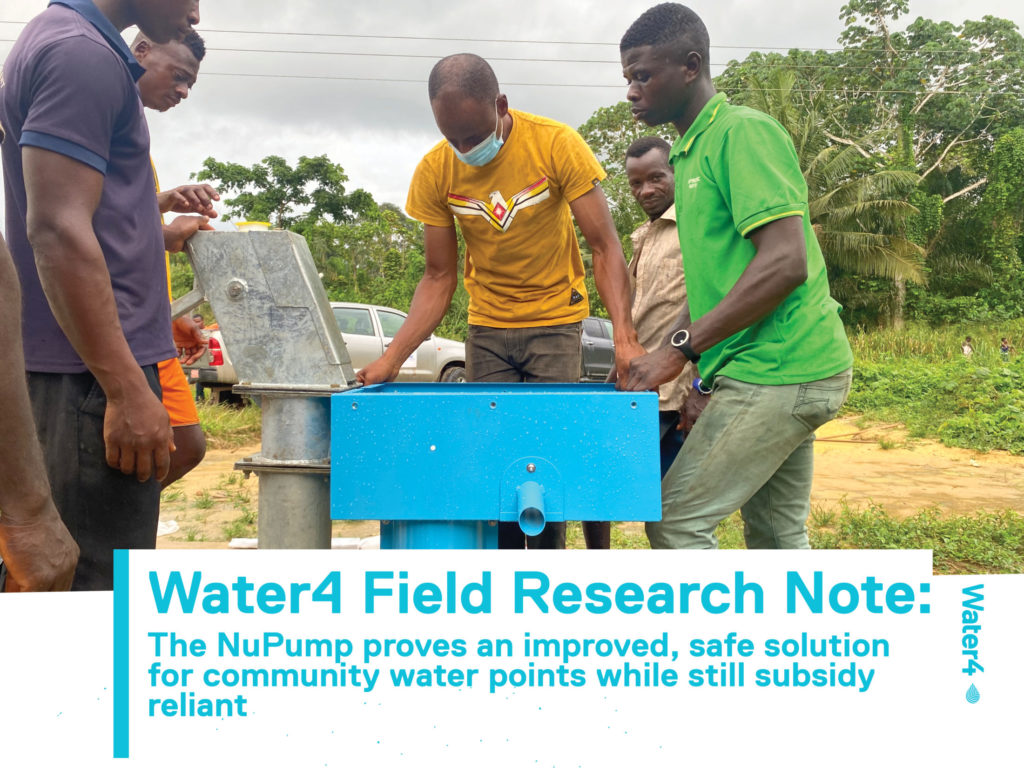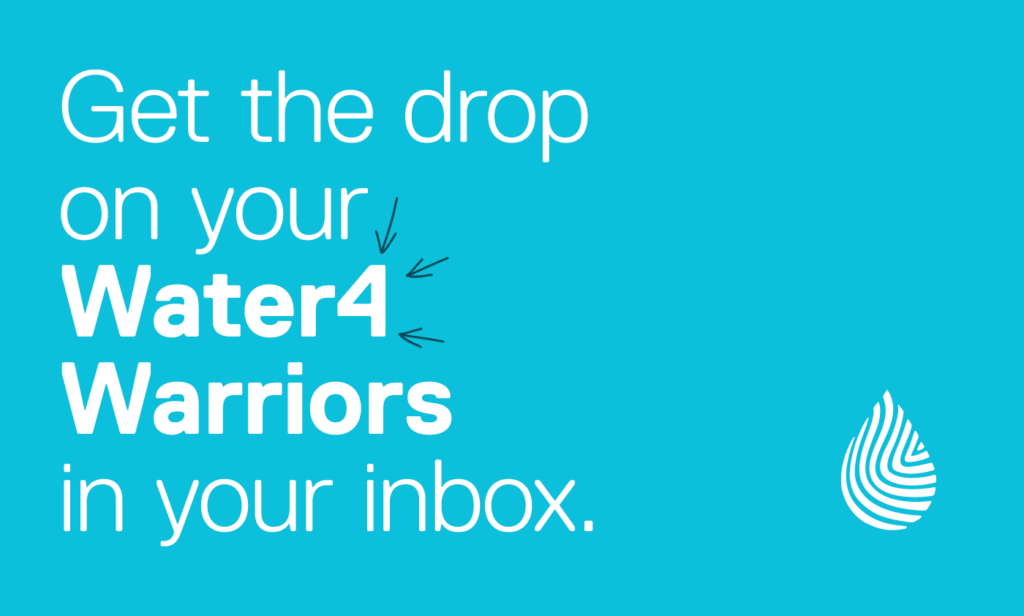Water4 Field Research Note: The NuPump proves an improved, safe solution for community water points while still subsidy reliant
Market Innovation: In January of 2022, Aquaya published a study on the willingness to pay for the NuPump, an innovation from Water4’s Research and Development Team. The Water4-invented NuPump is an in-line hand pump chlorinator with an erosion-based system that uses a chlorine cartridge and a small sediment filter. NuPump was created with rural health clinics as a primary target, but also desiring to test whether rural communities would be more likely to pay for hand pump maintenance if the water was treated–differentiating NuPump water from that of the typical free NGO hand pump. The NuPump, with a capital cost of $900-1,000, was piloted with the aim of offering a better water service while improving revenue collection from existing hand pump customers.
Testing the Product-Market Fit: Aquaya spent nine months independently evaluating the technical functionality of the NuPump chlorinators, estimating the longevity of the erosion chlorine cartridge, observing maintenance requirements and frequency, assessing the impact on water quality, collecting user feedback on use, taste and safety perceptions, and measuring willingness-to-pay of customers for adding NuPump treatment to their existing hand pump service. Aquaya’s independent assessment surveyed 661 households, 184 within the treatment communities and 477 within the control communities. The findings of the double-bound method concluded that households would be willing to increase monthly payments from 4.3 GHS/month to 6.5 GHS/month, on average. Up to 82% of households would be willing to pay at least 1 Ghanian cedi (GHS) in addition to their current NUMA payment to have the NuPump. However, once customers had a NuPump installed, they reported a reduction in the handpump’s flow rate as compared to their previous pump so they had to pump longer and harder to fill the same vessel. They also reported a smell of chlorine and a different taste, which was described as salty.
The Jobs to Be Done Theory: Is there a market for NuPump? Let’s look at a framework for understanding customer behavior. Bob Moesta, President and CEO of Re-wired Group, and the late Professor Christensen at the Clayton Christensen Institute developed The Jobs to Be Done theory. The theory simply states that people buy products or services to make progress in a specific circumstance, which goes beyond functional considerations to include both social and emotional factors.
The increased willingness to pay for NuPump suggests that the device, in addition to meeting a functional need, may be satisfying to household members from a social and emotional perspective. The new product “pulls in” household members looking to access clean water in relatively less time. NuPump is perceived as a product that can be “hired” to meet that need. Jacob Fohtung at the Christensen Institute has studied Water4’s work in Sierra Leone. His blog showcases how NUMA units can increase accessibility of safe water especially for those with the greatest need. The NuPump chlorinator is another aspect of the NUMA modularized system with the ability to increase accessibility of safe water across Africa.
Market Test Results: Water4 has used the study findings to conclude the following:
- Water Quality: NuPump water is safe to drink, and offers a pioneering solution to delivering safely managed water at community water points. The technical performance of the product is best in class. It consistently doses hand pump water within a circuit rider maintenance operation. NGOs have shown great interest in Water4 open sourcing the NuPump technology for their own use.
- Financial Viability: The additional fee that households are willing to pay for a NuPump is sufficient to cover its operating costs for chlorine cartridges and minor repairs, but insufficient to pay for major repairs in the long-term. Based on customer willingness to pay, the costs of the NuPump v1.0 cannot be fully recovered through user fees. Subsidies would be required to make NuPump a sustainable solution.
- Customer Experience: The customer is interested in a safe, tasty, and convenient product – factors that go beyond the mere functionality of the NuPump. While the NuPump meets the safety criteria, chlorine taste is often undesirable in developing markets. Likewise, convenience is almost always a priority over safety–meaning increased effort in pumping for water, even if guaranteed safe, is not preferred. Water4 will continue to innovate safe water solutions for this market, focusing first and foremost on the customer experience.
What’s Next? Water4 observed the same truth that has made efforts with NUMA piped water successful: consumers prioritize their water choices in order of convenience, cost, taste, aspiration and health. The NuPump still remains a viable product for health care facilities reliant on hand pumps, treating the water on demand where health is the highest priority.




